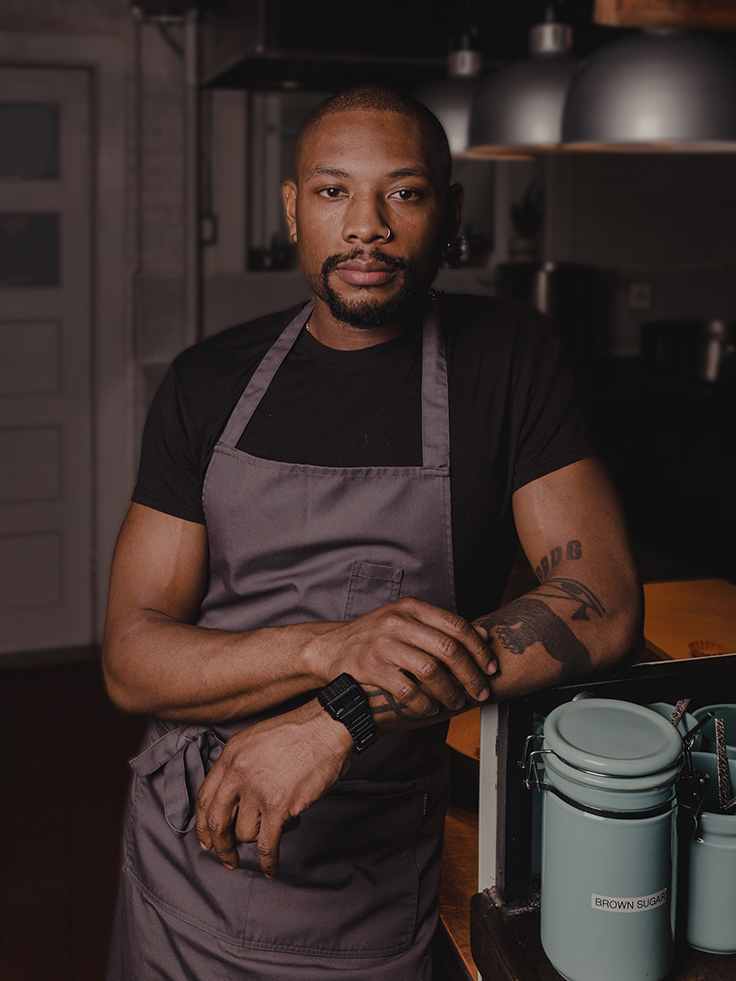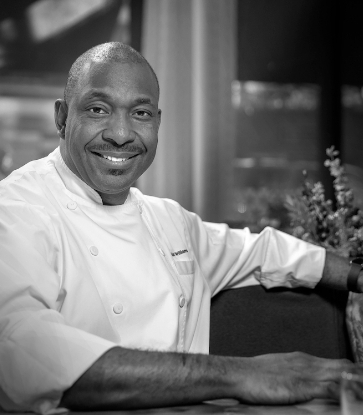Robert Curtis, who was most recently the executive chef at Washington, DC Bib Gourmand restaurant Hazel, is a graduate of Johnson & Wales in Charlotte, North Carolina. He came to DC by way of an apprenticeship at Two-MICHELIN-Starred noma, Brabo and now-closed Restaurant Eve in Alexandria, Bourbon Steak in Georgetown, and now-closed RN74 in San Francisco. As part of The MICHELIN Guide’s series of interviews covering inequity in the hospitality industry, chef Curtis talks about culinary school and breaking preconceived notions about Black chefs.
This interview has been edited and condensed for clarity.
Where did you grow up, and what did you eat when you were growing up?
I was born in Philadelphia, Pennsylvania and moved a lot when I was a kid: from Philadelphia to Detroit to the DC area. I spent most of my childhood in the Maryland side of DC. My mom grew up in Detroit, and her whole family are from Louisiana and the Midwest. My dad grew up in Dayton, Ohio. They met in New York.
I ate everything when I was growing up. My parents did a really great job of exposing us to tons of different food and different cultures. Philadelphia had a great Italian food scene when I was a kid. In/around Detroit, which has a high concentration of Arab Americans in Dearborn, you saw so many different foods and cultures. My elementary school hosted an international day and at least 70 countries were represented.
Everyone in my family is a pretty good to really great cook. My mom always cooked, and she did everything. She’d make you a tamale pie, some southern soul food, corned beef and cabbage every St. Patrick’s day, even though we have zero Irish roots whatsoever. She can bake anything from scratch no matter what it is. My dad had a habit of ordering Chinese food and, to this day, I’m still a sucker for a really good General Tso’s chicken, but he also has an amazing 15-hour brisket. My stepmom has no end to recipes she’s aware of. My brother is the best at making homemade pizza.
When did you know you wanted to work in restaurants/become a chef?
Everyone cooking and eating a variety of foods definitely had an impact on wanting to become a chef. Entering my senior year of high school, I started looking at food and health differently and to see a holistic approach. When I started thinking about college, I began looking at nutrition as a focus. I wound up finding culinary school and thought this would be an interesting route to take. My parents of course hated it, my dad less so than my mom. My mom definitely told me we were going to stop at every university between our house in DC and Charlotte, North Carolina [where Johnson & Wales is] to dissuade me.
They were definitely on the fence, but I think after the first year of me being in culinary school, they sort of came around.
What kind of jobs did you get during and after culinary school? What were the pay, benefits and work-life balance like?
I did everything: dishwashing, delivering sushi, I worked at Smoothie King for a while, I was a line cook in bars and restaurants. It was a very hard time, but it prepared me for actually being in the industry. I was waking up at 7am to go to school until 2pm, going right to work afterwards and then working until 10pm five to six days a week. I absolutely did not have any work life balance in school. When you’re that young, you make the best of it. The pay was very low. I was super excited when I hit $9 an hour. This was the biggest moment; I broke out of the $7.50 an hour rate (this was 2008), in Charlotte, NC. Money went a lot further there; three of us rented a house, each paying $200 a month.
In your opinion, what are the primary benefits of going to culinary school?
You wind up developing this knowledge of all these basics and you talk with people about different food. Without the right tutor, you miss out on this very wide base of knowledge. I’ve never made coquilles St.-Jacques in my life, but I know what it is. I came out of culinary school knowing the difference between east and west coast oyster flavor profiles. I don’t know if I’d have had the same exposure if I hadn’t gone.
When you were in culinary school, did you feel you had to work twice as hard to prove yourself?
It was about breaking away from people’s preconceived ideas about who you were and what you were capable of. And I don’t know if this only applies to culinary school; people have a preconceived idea of what you should look like, sound like, act like. You have to work harder to prove that that’s not you, and that you should be seen as an individual rather than part of a larger group of people.
That was one of the great things about going to culinary school in Charlotte: I was surrounded by Black friends. When I grew up in DC, I lived in a predominantly white neighborhood, and a predominantly white school.
Do you think the cost of school is worth the benefits?
I think you can be extremely successful if you don’t go to culinary school or university, but it’s about how much work you’re willing to put in. Can I say that culinary school benefited me? Of course I can say that. When I went, I earned a lot of scholarships. I walked out with $10-$15,000 in loans at the time, which I was able to pay off in a couple of years. What I see happening to other people is, they take on a lot of student loans, and in order to pay them off, they have to try and achieve some level of fame that most entry level chefs just can’t. So I see a lot of talented chefs not go into high-end dining or fine dining but instead work for Chartwells, which is not bad, but you wonder where people would be without that debt.
Do you feel that attending culinary school is necessary to succeed in the industry?
With the right mentors — people who are willing to teach and show you the way — culinary school winds up not being necessary. It should be a bonus, rather than the base for everyone. At this point, if you really want to go to school and be in the industry, I would recommend getting a business degree, or having some basics [business skills], because that’s 50% of what all chefs do. Everyone loves creating and artistry — I’d never say otherwise — but the other aspect [of being a chef] is balancing the labor and food costs and having an understanding of how to read the spreadsheets.
Is this more/less true for Black chefs?
I think it helps with the breaking away from preconceived ideas, but I don’t think it’s the same for everybody. I think culinary school can help you do that for a lot of people. I still think that, if you’re Black and you don’t have some degree of higher education, that in some people’s minds, that automatically puts you into a group. And even then, there’s still a stigma in the service industry against black people in general.
What (or who) has been the most critical factor in your success as a chef?
All my chef peers have definitely contributed to me becoming a better chef. Most of the lessons that I take with me have come from my parents and how I was raised. My mom trying to get me to be a better person had a really strong impact on me. My dad, who grew up in the projects, took a track scholarship and went to Harvard and Columbia, showed me what it looks like to have really great people around you who support you.
How do you think the industry can better support Black chefs and food service?
I think there’s a lot that could be done. The first is acknowledging their existence — chefs, sommeliers, front and back of house, food service workers. The next is realizing that we are all individuals. We tend to associate one with the other. One of my first fine dining experiences, the chef straight up told me he didn’t like the way I was performing and, because of me, he would never hire another Black chef. Even in schools we do it a lot: one person behaves badly and you tend to associate it with everyone in that group, whereas that’s done less with other staff members. This is the biggest thing; to recognize the individual, and to not to see Black chefs and food services workers as one homogenized group.















